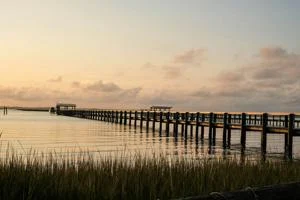Charter captains, commercial fishermen and recreational fishing advocates launched a national campaign this week urging President Donald Trump to issue an executive order restricting foreign industrial fishing in U.S. waters.
The campaign calls for new protections to defend American jobs, marine ecosystems and the future of coastal communities.
The campaign, titled “Make America Fish Again,” was introduced this week at a virtual news conference with participants from Virginia, Maryland, Louisiana and other coastal states. Organizers say foreign-controlled fleets are overharvesting forage fish like menhaden, herring and mackerel. These small schooling species serve as prey for larger predators such as striped bass, tuna and whales.
They are asking President Donald Trump to take executive action to ban midwater trawling and reduction fishing, direct NOAA to set science-based catch limits and prioritize access to U.S. waters for domestic fleets.
“Only the Lord can save more fish than Donald Trump,” said Capt. Vinnie Calabro, a commercial striped bass fisherman and charter operator.
Virginia’s central role in the issue
Virginia is at the center of the debate. According to the Atlantic States Marine Fisheries Commission, Virginia received 75.2% of the total Atlantic menhaden catch allocation in 2023. Ocean Harvesters, a Reedville-based company, operates the menhaden operating in the commonwealth. Ocean Harvesters has a long-term supply contract with Omega Protein, which is owned by Canada-based Cooke Inc.
U.S.-based Ocean Harvesters has defended its work in Virginia, noting that menhaden fishermen have operated continuously for over 145 years in the region.
“Ocean Harvesters vessels are crewed primarily by American fishermen, many of whom are multi-generational, holding the same jobs as their fathers and grandfathers. The fishery employs hundreds of local workers directly, and hundreds more indirectly, and has long been one of the best sources of good-paying jobs in the region,” the company said in a statement.
Menhaden are not directly consumed by people but are processed into fishmeal and oil. Sportfishing and conservation groups argue that industrial “reduction fishing” depletes the base of the marine food chain and harms both ecosystems and the fishing economy.
“Our anglers have long been concerned about large-scale reduction fishing in our fragile Chesapeake Bay,” said Steve Atkinson, chairman of the Virginia Saltwater Sportfishing Association. “We encourage President Trump to protect these critical forage fish and our fishing economy.”
The news release cites federal data showing 2.3 million U.S. jobs and a $321 billion domestic fishing economy could be affected by overfishing. In Virginia and Maryland, striped bass harvests have dropped by more than half since the mid-2000s, according to NOAA Fisheries.
In the Chesapeake Bay, a 2023 study published in Frontiers in Marine Science reported that osprey reproduction in the bay’s main stem fell to 0.6 chicks per active nest, below the 1.15 threshold needed for sustainability. Researchers linked the decline to reduced availability of menhaden, a key forage species.
“This is more than fishing,” said Capt. Michael “Red” Frenette, a Louisiana charter guide featured in the campaign video. “I’m speaking up for thousands of communities like mine. We’ve had enough.”
The campaign has now called on Trump to issue an executive order with four main directives:
Ban midwater trawls for forage speciesEnd reduction fishing of small bait fish in U.S. watersDirect NOAA to manage forage fish for ecosystem healthSet science-based catch targets to protect predator species
Organizers say the effort aligns with the president’s focus on economic nationalism and marine conservation.
As previously reported by The Center Square, the conflict centers on local anglers’ claims that a Canadian-owned company is dominating menhaden fishing in U.S. waters. A federal judge dismissed a 2021 lawsuit in January against Cooke Inc., Ocean Fleet Services, Ocean Harvesters and others.
The lawsuit had argued the companies misrepresented their structure to qualify for U.S. fishing permits in violation of federal ownership rules.
The judge ruled the claims didn’t meet the legal standard under the False Claims Act. But the plaintiffs appealed, arguing the companies violated the American Fisheries Act, which requires commercial fishing vessels to be U.S.-owned and controlled.
A group of law professors backed the appeal, saying in a court brief that the ruling overlooked states’ long-standing rights to protect wildlife and weakened natural resource protections.
Ocean Harvesters, which operates the vessels, said it follows all U.S. laws.
“As required by U.S. law, all menhaden fishing is conducted by U.S.-owned fishing companies, and vessels are crewed primarily by American fishermen,” the company said.
It also said that it operates in a tightly-regulated industry and denied overfishing.
“The Atlantic States Marine Fisheries Commission, the interstate body that manages menhaden, has repeatedly found that the species is not overfished and that overfishing is not occurring – most recently confirming this finding in its 2022 stock assessment,” Ocean Harvesters said. “The Gulf States Marine Fisheries Commission similarly found in 2024 that Gulf menhaden is not overfished and overfishing is not occurring.”
In April, President Trump issued a separate executive order that expanded commercial fishing access in the Pacific Remote Islands Marine National Monument. The order opened federal waters to U.S.-flagged vessels within 50 to 200 nautical miles of the monument’s boundaries. A White House fact sheet said the move would support jobs in places like American Samoa and help counter “rampant illegal, unreported, and unregulated fishing by foreign fleets.”
The Center Square contacted the White House for comment, but had not received a response by the time of publication.






